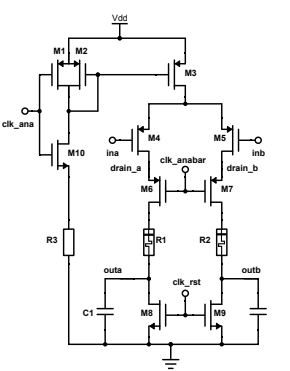Accounting for Memristor I-V Non-linearity in Low Power Memristive Amplifiers
Also Available Domains Low Power VLSI
Abstract
Detecting neuronal activity for rehabilitation/assistive devices is an example of extreme edge computing, featuring stringent requirements for data bandwidth from implantable acquisition system, low-power consumption and ideally also low latency. The proposed neural recording system which detects neural spikes directly on the signals collected from electrophysiological probes. The system achieves power efficiency by utilizing a combination of integrative sensing and ultra-fine offset compensation. A central component of this design is a memristive load, which is utilised as a trimming device along the differential branches of the core amplifier, ultimately allowing system offset tuning with µV precision. In this paper, we study the impact of memristor IV non-linearity on the effective gain and offset compensation capability of the system. Results show that the non-linearity experimentally measured from our in-house metal-oxide memristor technology only induces a small gap between nominal resistive state and static RS (as reflected on the IV). This leads to a very small degradation of gain (nearly ≈ 2.5%) and offset compensation (≈ 50% increased offset tuning sensitivity), but very crucially proves that introducing IV non-linearity does not materially change either the extreme offset trimming precision or the overall performance.so for simulating and observing the output wave forms of the proposed we used the LT-Spice in windows environment.
NOTE: Without the concern of our team, please don't submit to the college. This Abstract varies based on student requirements.
Block Diagram

Specifications
Software Requirements:
- LT-spice
- Technology files: 45nm
Hardware Requirements:
- Microsoft® Windows XP
- Intel® Pentium® 4 processor or Pentium 4 equivalent with SSE support
- 512 MB RAM
- 100 MB of available disk space
Learning Outcomes
- Introduction to memristrive amplifiers
- Need of memristive amplifiers in Biomedical applications
- Transistors & its applications
- Types of Transistors
- Logic Gates using Transistors
- Pull Up and Pull Down networks
- Importance of Transistors
- MOS Fundamentals
- NMOS/PMOS/CMOS Technologies
- How to design circuits using Transistor logic?
- Amplifier design using combination of transistors and memristors
- How to design low power, high speed area efficient transistor level circuits?
- Drawbacks in CMOS technology
- Scope of memristive amplifiers in today’s world
- Applications in real time
- LT-Spice tool for design and simulation
- Solution providing for real time problems
- Project Development Skills:
- Problem Analysis Skills
- Problem Solving Skills
- Logical Skills
- Designing Skills
- Testing Skills
- Debugging Skills
- Presentation skills
- Thesis Writing Skills





 Paper Publishing
Paper Publishing
